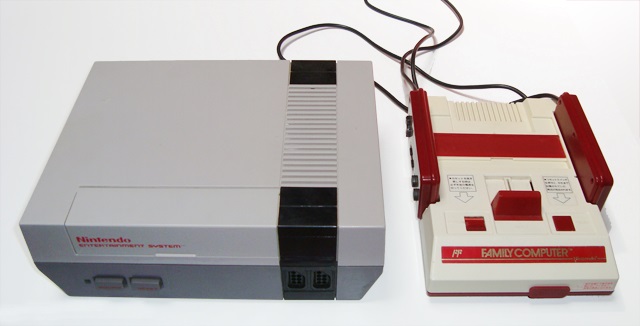
You can keep your long-running debate about how to pronounce GIF. For me, the argument over how to pronounce "NES"—the abbreviation for the Nintendo Entertainment System—is the more interesting and contentious debate.
Whenever the argument over this inconsequential question comes up—in forum debates, Twitter threads, Slack chat rooms, or even in-person conversations—it never fails to draw strong feelings. People who grew up pronouncing each letter in "N-E-S" are met with those who have gone their whole lives calling it "ness" (or "nezz" in some cases). Both sides are usually equally stringent in their decision and wonder how the other side could possibly think they're right.
For years, I thought that Nintendo had "officially" settled that debate (as far as it could be settled) in favor of pronouncing each letter of "N-E-S." But now, a throwaway line in the Japanese version of WarioWare Gold has thrown everything into question once again.
N-E-S in the U-S-A
I've been somewhat obsessed with the (again, admittedly unimportant) question of "NES" pronunciation since at least 2010, when I first polled my Twitter followers about it. The unscientific results were overwhelmingly in favor of "en-ee-es" back then, as they were when I re-ran the poll in 2016.
All that proves, though, is that I have smart, largely homogenous Twitter followers. But for years, I could at least tell those followers that they had support from Nintendo itself in pronouncing the abbreviation as "N-E-S."
While Nintendo hasn't responded to a request for comment from Ars, the "official" evidence is practically overwhelming. Classic advertisements for first-party games like Dr. Mario, Kirby's Adventure, and Yoshi all call the system "N-E-S" (others use the fuller "Nintendo Entertainment System"). At least two Super NES commercials from the era continued the tradition, referring to the "Super N-E-S" (not the "super ness").
Nintendo's late president, Satoru Iwata, referred to "N-E-S Remix 2" in a 2014 Nintendo Direct presentation. Nintendo's Bill Trinen similarly talks about the "N-E-S Remix" series in a late 2014 Nintendo Direct presentation. Two "Nintendo Minute" presenters talk about the "N-E-S Classic Edition" in a 2016 promotional video.
If you still wish to play an NES, please keep in mind that we are unable to offer repair for the system. -Nintendo.com Troubleshooting page
You can also see this "official" stance in writings from Nintendo, where the company routinely writes "an NES" (which only makes grammatical sense as "an N-E-S") rather than "a NES" (which would be read as "a ness"). You can find "an NES" written on multiple Nintendo.com troubleshooting pages, in numerous official press releases, and as the header for at least one "Iwata Asks" interview segment.
(Interestingly, Tecmo development head Yosuke Hayashi refers to "a NES game" multiple times in that Iwata Asks interview, which is the closest I could come to finding official Western acknowledgement of the "ness" pronunciation.)
There's also a 2017 Financial Times interview where Nintendo of America President Reggie Fils-Aime is quoted talking about "an SNES Classic." That only works if you read it as "an S-N-E-S Classic." Sorry, fans of "sness" (or "snezz." Or "Super ness." Or... well, maybe he said "es-ness"?).
A foreign schism?
I'm willing to acknowledge that plenty of people grew up calling their system "ness" and that pronunciation of abbreviations and initialisms depends a lot on personal choice and regional dialect ("Ness" seems more popular in Great Britain than America, for instance). That said, the above evidence makes it pretty clear that Nintendo's position is that every letter in N-E-S should be read individually when spoken.
So it was a bit surprising to see a tweet this morning showing a screen from the Japanese version of the newly released WarioWare Gold. There, the letters "NES" are accompanied by the katakana ネス, which can be romanized as "nesu" or "ness."In the museum section of the Japanese version of Wario Ware Gold, you can unlock some slides showcasing the Famicom. Also included is a picture of the NES. Within the description, Nintendo themselves says that “NES” is pronounced “Ness”. pic.twitter.com/Vg5JjXgJgy
— Kyle McLain (@FarmboyinJapan) August 3, 2018
As least one crowdsourced conversational English-to-Japanese reference site seems to show the same pronunciation split between Japan and America. In an entry for Nintendo Entertainment System (machine translation), the authors at "Eijiro" note that "the pronunciation by Nintendo of Japan is 'NESU,' and by Nintendo of America is 'EN II ESU.'"
It seems Nintendo of Japan has a massive schism from Nintendo of America on this important (read: utterly unimportant) issue. But part of the difference might just be down to the vagaries of translation. Localization professional Andrew Vestal told Ars that while "ness" only requires two katakana, writing out "エン イー エス" is more of a hassle.
And while "N-E-S" is only three syllables in English, the straight Japanese transliteration "en ii esu" needs six syllables and "requires a Japanese speaker to quickly string together multiple 'ee' and 'eh' vowel sounds without a break in a very unnatural way," as Vestal put it. This is a common issue in going from English to Japanese, where the two-syllable Xbox can become the six-syllable "ekkusu bokkusu" (and the eight kana "エックスボックス").
For the most part, this doesn't come up among Japanese speakers, who simply call the system "Famicom" unless referring specifically to foreign models. Still, I'll grudgingly admit that supporters of the "ness" pronunciation can now point to their own "official" support, straight from Nintendo of Japan.
Now, on to more important matters: how do you pronounce the PS2 game Ico?
reader comments
286